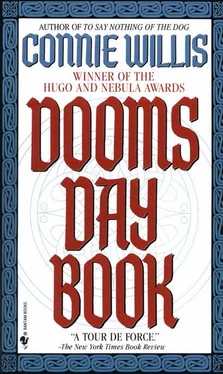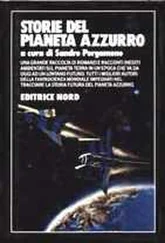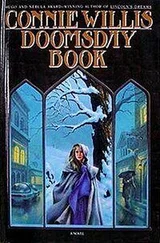She straightened weeds up around the chest to hide it and laid a branch over it, and then started up the hill. The road, except for the frozen mudhole at the bottom, was smoother than Kivrin had expected, and pounded flat, which meant horses used it a good deal in spite of its empty look.
It was an easy climb, but Kivrin felt tired before she had gone even a few steps, and her temple began to throb again. She hoped her time-lag symptoms wouldn’t get worse—she could already see that she was a long way from anywhere. Or maybe that was just an illusion. She still hadn’t “ascertained her exact temporal location,” and this lane, this wood had nothing about them that said positively 1320.
The only signs of civilization at all were those ruts, which meant she could be in any time after the invention of the wheel and before paved roads, and not even definitely then. There were still lanes exactly like this not five miles from Oxford, lovingly preserved by the National Trust for the Japanese and American tourists.
She might not have gone anywhere at all, and on the other side of this hill she would find the M-1 or Ms. Montoya’s dig, or an SDI installation. I would hate to ascertain my temporal location by being struck by a bicycle or an automobile, she thought, and stepped gingerly to the side of the road. But if I haven’t gone anywhere, why do I have this wretched headache and feel like I can’t walk another step?
She reached the top of the hill and stopped, out of breath. There was no need to have gotten out of the road. No car had been driven along it as yet. Or horse and buggy either. And she was, as she had thought, a long way from anywhere. There weren’t any trees here, and she could see for miles. The wood the wagon was in came halfway up the hill and then straggled south and west for a long way. If she had come through farther into the trees, she would have been lost.
There were trees far to the east, too, following a river that she could catch occasional silver-blue glimpses of—the Thames? the Cherwell?—and little clumps and lines and blobs of trees dotting all the country between, more trees than she could imagine ever having been in England. The Doomsday Book in 1086 had reported no more than 15 per cent of the land wooded, and Probability had estimated that lands cleared for fields and settlements would have reduced that to 12 per cent by the thirteen hundreds. They, or the men who had written the Doomsday Book , had underestimated the numbers badly. There were trees everywhere.
Kivrin couldn’t see any villages. The woods were bare, their branches gray-black in the late afternoon light, and she should be able to see the churches and manor houses through them, but she couldn’t see anything that looked like a settlement.
There had to be settlements, though, because there were fields, and they were narrow strip fields that were definitely mediaeval. There were sheep in one of the fields, and that was mediaeval, too, but she couldn’t see anyone tending them. Far off to the east there was a square gray blur that had to be Oxford. Squinting, she was almost able to make out the walls and the squat shape of Carfax tower, though she couldn’t see any sign of the towers of St. Frideswide’s or Osney in the fading light.
The light was definitely fading. The sky up here was a pale bluish-lavender with a hint of pink near the western horizon, and she wasn’t turned around because even while she had stood here, it had gotten darker.
Kivrin crossed herself and then folded her hands in prayer, bringing her steepled fingers close to her face. “Well, Mr. Dunworthy, I’m here. I seem to be in the right place, more or less. I’m not right on the Oxford-Bath road. I’m about five hundred yards south of it on a side road. I can see Oxford. It looks like it’s ten miles away.”
She gave her estimate of what season and time of day it was, and described what she thought she could see, and then stopped and pressed her face against her hands. She should tell the Doomsday Book what she intended to do, but she didn’t know what that was. There should be a dozen villages on the rolling plain west of Oxford, but she couldn’t see any of them, even though the cultivated fields that belonged to them were there, and the road.
There was no one on the road. It curved down the other side of the hill and disappeared immediately into a thick copse, but half a mile farther on was the highway where the drop should have landed her, wide and flat and pale green, and where this road obviously led. There was no one on the highway for as far as she could see.
Off to her left and halfway across the plain toward Oxford she caught a glimpse of distant movement, but it was only a line of cows heading home to a huddle of trees that must hide a village. It wasn’t the village Ms. Montoya had wanted her to look for—Skendgate was south of the highway.
Unless she was in the wrong place altogether, and she wasn’t. That was definitely Oxford there to the east, and the Thames curving away south of it down to the brownish-gray haze that had to be London, but none of that told her where the village was. It might be between here and the highway, just out of sight, or it might be back the other way, or on another side road or path altogether. There was no time to go and see.
It was rapidly getting darker. In another half hour there might be lights to go by, but she couldn’t afford to wait. The pink had already darkened to lavendar in the west, and the blue overhead was almost purple. And it was getting colder. The wind was picking up. The folds of her cloak flapped behind her, and she pulled it tighter around her. She didn’t want to spend a December night in a forest with a splitting headache and a pack of wolves, but she didn’t want to spend it lying out on the cold– looking highway either, hoping for someone to come along.
She could start for Oxford, but there was no way she could reach it before dark. If she could just see a village, any village, she could spend the night there and look for Ms. Montoya’s village later. She looked back down the road she had come up, trying to catch a glimpse of light or smoke from a hearth or something, but there wasn’t anything. Her teeth began to chatter.
And the bells began to ring. The Carfax bell first, sounding just like it always had even though it must have been recast at least three times since fifteen hundred, and then, before the first stroke had died away, the others, as if they had been waiting for a signal from Oxford. They were ringing vespers, of course, calling the people in from the fields, beckoning them to stop work and come to prayers.
And telling her where the villages were. The bells were chiming almost in unison, yet she could hear each one separately, some so distant only the final, deeper echo reached her. There, along that line of trees, and there, and there. The village the cows were heading to was there, behind that low ridge. The cows began to walk faster at the sound of the bell.
There were two villages practically under her nose—one just the other side of the highway, the other several fields away, next to the little tree-lined stream. Skendgate, Ms. Montoya’s village, lay where she thought it did, back the way she had come, past the frozen ruts and over the low hill now more than two miles.
Kivrin clasped her hands. “I just found out where the village is,” she said, wondering if the sounds of the bells would make it onto the Doomsday Book. “It’s on this side road. I’m going to go fetch the wagon and drag it out onto the road, and then I’m going to stagger into the village before it gets dark and collapse on somebody’s doorstep.”
One of the bells was far away to the southwest and so faint she could hardly hear it. She wondered if it were the bell she had heard earlier, and why it had been ringing. Maybe Dunworthy was right, and it was a funeral. “I’m all right, Mr. Dunworthy,” she said into her hands. “Don’t worry about me. I’ve been here over an hour and nothing bad has happened so far.”
Читать дальше












